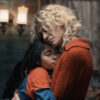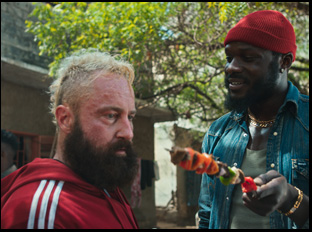If “Zero” started out considerate of the limitations that Jean-Luc Herbulot, Hus Miller and Cam McHarg might have in setting up a film of any type, keeping their story to a couple characters and filming on the fly in Herbulot’s home of Dakar where dollars could be stretched to their maximum potential, they show just how big they were thinking elsewhere as early as possible when no less than Willem Dafoe describes the origins of the world in the film’s opening minutes. It’s a lofty introduction to an action thriller that doesn’t hang on the fate of humanity as a whole, but the tale of two Americans (Miller and McHarg) who have to figure out why they’ve ended up with bombs strapped to their chest as they’re directed around Senegal on earpieces by disturbingly giddy unknown voice (Dafoe) nonetheless has high stakes when any wrong turn could lead not only to instant death for themselves but for hundreds of others in the streets that they’re around at any given time.
Herbulot previously turned Senegal’s coastline bordering the Atlantic into a thrilling backdrop for the stylish action film “Saloum” where narrative sea changes occurred at the same rate as the rolling tides when all hell broke loose over a bounty of gold bricks, and he works similar magic in his third feature where Miller and McHarg, known only as “One” and “Two” after being led on a mission that has no obvious end, race through town, dodging goats, political protests and any authorities they may draw suspicion from. Able to follow the film’s protagonists – or are they? – through narrow alleys and flooded intersections, the film takes a larger view well before Herbulot sends drones up into the sky for incredible chase footage when the two Americans may not appear to be overtly violent when left to their own devices but their presence proves to be a threat to each community they enter, with the two individuals driven by forces larger than themselves that they can’t fully fathom and carrying out a fear campaign that ultimately could do damage to everyone.
In staging a race against time all throughout Dakar, “Zero” shows off the beauty to be found there amidst the looming threats against it that locals have long been asked to endure and the film is as visually energetic as it is propulsive plot-wise as One and Two seek to disarm. After making its premiere last year at Beyond Fest in Los Angeles, the film is heading to theaters across the country this week and Herbulot, Miller and McHarg spoke about setting the film in Senegal and filming with abandon on its busiest thoroughfares, getting Dafoe’s inimitable voice into the mix and dealing with a diva on set, one particular four-legged co-star.
Jean-Luc Herbulot: It’s because of these two guys [Cam and Hus]. I met Cameron on a short movie that I directed in Los Angeles 12 years ago and the experience was great. And Cameron and Hus came to me and said they wanted to make a movie. I was just coming out of my second one [“Saloum”] and I was in Senegal and the interesting thing about Senegal is it’s like a gold rush for [the film] industry right now. So I [said], “Guys, I think it could be interesting if we try to do something here.” They were brave enough to to come to Senegal and see what’s what was happening there and we just all fell in love with what we could do.
The idea of having those two guys with bomb straps on their chest came came very quickly, but then the challenge for all of us was, “Okay. It’s going to be fun and there’ll be action, but what’s the emotional core of it?” And I remember having this discussion with Hus because as a more experienced director, I focus more on emotions and how you craft them, so it was like if you have five seconds to talk to the person that you never met, [someone like] your daughter or your son, what would you say? That was when we were like, “Whoa, there’s an emotional anchor in that.” So yes, of course, there is the action and a crazy chronometer, but for the most part, that came after we found the emotional core. So it can look like a like a very crazy action movie, but at the core of it there was always some heart that we were searching for and I hope we have it now.
Hus Miller: It was a great process. Cameron and I had done a short film previously, so Cameron and I knew each other well, but Jean-Luc and I really didn’t know each other and there was a learning curve to just how both of us work. But it was a dream team — there were the ups and downs like there always are, but in terms of writing Jean-Luc really had the core story idea and the vision of what he wanted to do and then I came in and helped with the storyline. Obviously Cameron was in meetings the whole way through too, so it was really collaborative and that really flowed into production. The level of trust from going from working with somebody as a writer or director and then going into t[the production where you] just let all that go and be an actor and trust the director’s vision, it was great and I want to do it again.
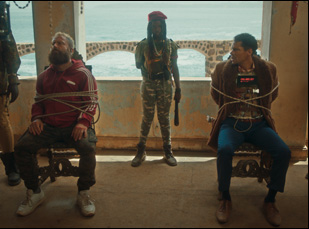 Cam, were you rethinking bringing these two together when you were sweating it out with a bomb strapped to your chest?
Cam, were you rethinking bringing these two together when you were sweating it out with a bomb strapped to your chest?
Cam McHarg: No, if you would have been with us just a minute ago before we came online, it probably sounded like a bunch of high schoolers with a keg in a garage. So it is a kind of a dream team, and you really had to hand your heart over to Jean-Luc and and trust he was gonna carry it.
What was it like designing these chase scenes across Senegal and then subsequently having to run through those streets?
Jean-Luc Herbulot: It was more fun for them.
Hus Miller: Or not. [laughs]
Jean-Luc Herbulot: Honestly, I’d been living in Senegal for probably two or three years before the guys came, and the scenes in “Zero” were just waiting for the story that we found. As a director, and I think it’s the same for actors, usually you’re already making movies in your head before making them. For example, we were talking about the fact that it was a great collaboration but I tried to make sure if [Hus and Cam] came in that movie, they take those characters and have the freedom to bring what they always wanted to bring. It’s just not just me saying, “Hey, I want this character and this character. It’s more like I’m giving you the A to Z sandbox to play with it. Are you okay to play with it?” And it’s the same thing for me as a director, which is “I have this idea of doing this. Where does it land in the movie?”
Hus Miller: Yeah, it was like being a kid again. There was the part of it that was absolutely exhausting because it was hot and I was wearing a wool coat for most of this, but it was so surreal I think that’s what worked so well about Cam and I being in Dakar was our minds being blown in terms of where we were and then stepping into the character and running through the streets. Cam and I joked all the time we felt like we were in an Indiana Jones movie. It was fun, and at the same time, it was exhausting.
A big part of it for me was the team of Senegalese people involved that made it, for exhausting as it was, so comfortable to work and we were bloody, sweaty, dirty and everything else, but the whole experience was just completely unforgettable. I still have visions sometimes when I’m sleeping of running through the street, but it was a blast.
Cam McHarg: Yeah, it was a sensory overload. You don’t have to do anything special with editing or anything like that to see how everything — the colors, the sounds – [overwhelms you] and I was a bleach blonde guy in a red jacket vest on in the middle of the city. It’s just a different kind of a thing shooting there and it wasn’t like this is a massive Hollywood production. People were just like, “There’s a crazy Russian-looking white guy in a red jacket with a bomb on his chest” — and I had no way to take it off. I was [strapped] into this thing for the day, so like Hus was saying, it was the craziest but also the best experience in my life, even though we were injured [at times] and everybody took a turn being sick at some point. But I would do it again in a heartbeat.
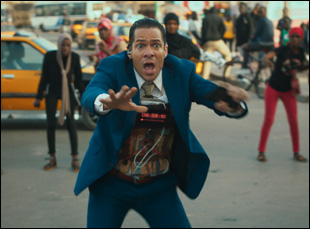 What was it like working with Emmanuel the goat? It looked like it preferred Hus.
What was it like working with Emmanuel the goat? It looked like it preferred Hus.
Hus Miller: We got better after a day of working together, but that was an experience in itself, walking with this huge ram through the streets of Dakar. Talk about a surreal experience, but again, it was so crazy and Emanuel has a little bit of an attitude. Working with Emanuel as an actor was great, but had a little bit of an ego.
Cam McHarg: And it was a trip working with Gary Dourdan [who is also in the scenes with Emmanuel], he was so popular, I felt like it was the Beatles in the ’60s. It was like carloads of girls going by. “Dourdan!”
Jean-Luc Herbulot: People love “CSI” and [being] in Africa myself, I was surprised. But Gary has that thing of when he goes in a country, he knows the language, so he was talking Wolof to people, and I was like, “What the fuck man? Where’d you learn the Wolof?” [laughs] But for the ram stuff, there was a lot of genuine reactions in the movie, a lot unscripted in what you’re seeing. Gary was putting some lines in there where we were just laughing our ass off, so it was a good experience with that.
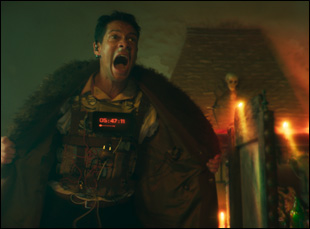 From what I understand, you hadn’t actually had any of the VoiceOver before Willem Dafoe came on towards the end of the process and it pulls the film together. What was that like to arrange?
From what I understand, you hadn’t actually had any of the VoiceOver before Willem Dafoe came on towards the end of the process and it pulls the film together. What was that like to arrange?
Jean-Luc Herbulot: Yeah, we have to give credit to Hus because that’s when you know that you have a great producer when you put yourself into a position where there is a mountain somewhere and you’re like, “We want that mountain” and a great producer is having somebody who says “We have it.” Then I think it was as simple as [Dafoe] saw the first cut, he liked it and he came [to do the VoiceOver], so that’s the dream situation. We didn’t have to chase him that much. And working with him was just flawless. What I felt so interesting about Willem is of course he’s gifted, but after 40 years of working in the industry, you can still feel like he’s having fun. He was just giving us seven options every three seconds and with Hus, I remember him saying the first line, “Now we’re on another level.”
Cam McHarg: I was actually in Atlanta for a little while when I did the ADR when [Jean-Luc] was [somewhere else].
Jean-Luc Herbulot: We were all separated all in different places.
Cam McHarg: That was the first time I heard Willem Dafoe’s voice yelling at me. [laughs]
Jean-Luc Herbulot: Yes, because what we didn’t see is for both Hus and Cam, it was my voice on the set, so it was like an annoying French accent. [laughs] But again, Hus, that’s his producing skill bringing this guy on the movie with us, and it went great. That’s one of those things where even if we didn’t know at that moment if we had a great movie, at least when you have somebody of that caliber coming out to play with you guys, [we thought] “Oh, maybe we have something.”
“Zero” opens on April 11th in theaters across the country and available on digital. A full list of theaters is here.



